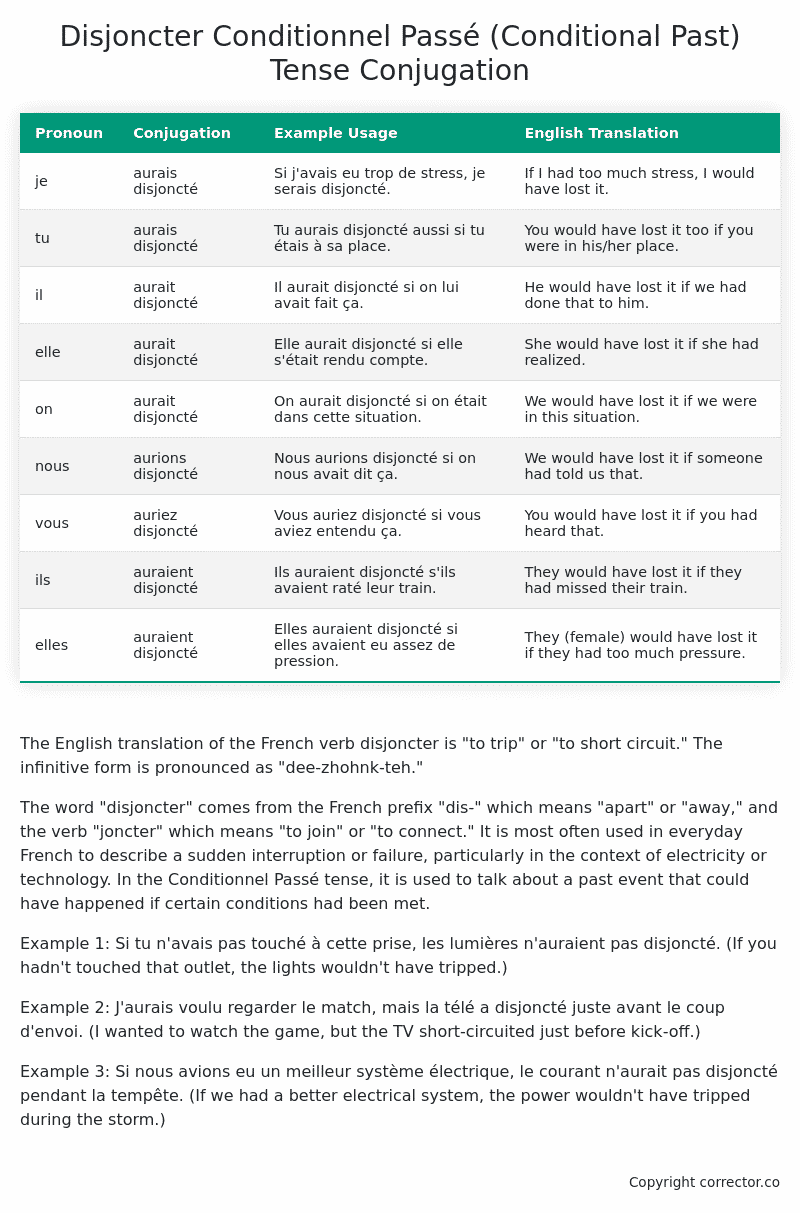Conditionnel Passé (Conditional Past) Tense Conjugation of the French Verb disjoncter
Introduction to the verb disjoncter
The English translation of the French verb disjoncter is “to trip” or “to short circuit.” The infinitive form is pronounced as “dee-zhohnk-teh.”
The word “disjoncter” comes from the French prefix “dis-” which means “apart” or “away,” and the verb “joncter” which means “to join” or “to connect.” It is most often used in everyday French to describe a sudden interruption or failure, particularly in the context of electricity or technology. In the Conditionnel Passé tense, it is used to talk about a past event that could have happened if certain conditions had been met.
Example 1: Si tu n’avais pas touché à cette prise, les lumières n’auraient pas disjoncté. (If you hadn’t touched that outlet, the lights wouldn’t have tripped.)
Example 2: J’aurais voulu regarder le match, mais la télé a disjoncté juste avant le coup d’envoi. (I wanted to watch the game, but the TV short-circuited just before kick-off.)
Example 3: Si nous avions eu un meilleur système électrique, le courant n’aurait pas disjoncté pendant la tempête. (If we had a better electrical system, the power wouldn’t have tripped during the storm.)
Table of the Conditionnel Passé (Conditional Past) Tense Conjugation of disjoncter
| Pronoun | Conjugation | Example Usage | English Translation |
|---|---|---|---|
| je | aurais disjoncté | Si j’avais eu trop de stress, je serais disjoncté. | If I had too much stress, I would have lost it. |
| tu | aurais disjoncté | Tu aurais disjoncté aussi si tu étais à sa place. | You would have lost it too if you were in his/her place. |
| il | aurait disjoncté | Il aurait disjoncté si on lui avait fait ça. | He would have lost it if we had done that to him. |
| elle | aurait disjoncté | Elle aurait disjoncté si elle s’était rendu compte. | She would have lost it if she had realized. |
| on | aurait disjoncté | On aurait disjoncté si on était dans cette situation. | We would have lost it if we were in this situation. |
| nous | aurions disjoncté | Nous aurions disjoncté si on nous avait dit ça. | We would have lost it if someone had told us that. |
| vous | auriez disjoncté | Vous auriez disjoncté si vous aviez entendu ça. | You would have lost it if you had heard that. |
| ils | auraient disjoncté | Ils auraient disjoncté s’ils avaient raté leur train. | They would have lost it if they had missed their train. |
| elles | auraient disjoncté | Elles auraient disjoncté si elles avaient eu assez de pression. | They (female) would have lost it if they had too much pressure. |
Other Conjugations for Disjoncter.
Le Present (Present Tense) Conjugation of the French Verb disjoncter
Imparfait (Imperfect) Tense Conjugation of the French Verb disjoncter
Passé Simple (Simple Past) Tense Conjugation of the French Verb disjoncter
Passé Composé (Present Perfect) Tense Conjugation of the French Verb disjoncter
Futur Simple (Simple Future) Tense Conjugation of the French Verb disjoncter
Futur Proche (Near Future) Tense Conjugation of the French Verb disjoncter
Plus-que-parfait (Pluperfect) Tense Conjugation of the French Verb disjoncter
Passé Antérieur (Past Anterior) Tense Conjugation of the French Verb disjoncter
Futur Antérieur (Future Anterior) Tense Conjugation of the French Verb disjoncter
Subjonctif Présent (Subjunctive Present) Tense Conjugation of the French Verb disjoncter
Subjonctif Passé (Subjunctive Past) Tense Conjugation of the French Verb disjoncter
Subjonctif Imparfait (Subjunctive Imperfect) Tense Conjugation of the French Verb disjoncter
Subjonctif Plus-que-parfait (Subjunctive Pluperfect) Tense Conjugation of the French Verb disjoncter
Conditionnel Présent (Conditional Present) Tense Conjugation of the French Verb disjoncter
Conditionnel Passé (Conditional Past) Tense Conjugation of the French Verb disjoncter (this article)
L’impératif Présent (Imperative Present) Tense Conjugation of the French Verb disjoncter
L’infinitif Présent (Infinitive Present) Tense Conjugation of the French Verb disjoncter
Struggling with French verbs or the language in general? Why not use our free French Grammar Checker – no registration required!
Get a FREE Download Study Sheet of this Conjugation 🔥
Simply right click the image below, click “save image” and get your free reference for the disjoncter Conditionnel Passé tense conjugation!

Disjoncter – About the French Conditionnel Passé (Conditional Past) Tense
Formation
Common Everyday Usage Patterns
Expressing Unreal Past Scenarios
Polite Requests or Suggestions
Expressing Doubt or Uncertainty
Interactions with Other Tenses
Conditional Present
Indicative Past Tenses
Conditional Future
Summary
Want More?
I hope you enjoyed this article on the verb disjoncter. Still in a learning mood? Check out another TOTALLY random French verb conjugation!


